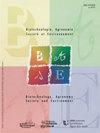管理过程中的控制人工制品:在巴西使用战略规划进行决策
IF 0.6
4区 农林科学
Q3 AGRONOMY
Biotechnologie Agronomie Societe et Environnement
Pub Date : 2017-11-24
DOI:10.4013/BASE.2017.143.03
引用次数: 1
摘要
本研究的目的是检验战略规划在巴西不同部门专业人员之间决策的适用性。基于战略规划是帮助任何组织决策过程的有效工具的假设,本研究通过由两组专业人员组成的场景进行,其中战略规划的应用会影响组织的未来决策。这项研究针对的是在公共和私人领域工作的专业人员,目的是了解这些专业绩效目标之间的特征是否与受访者最终决定中不同待遇的影响因素相对应。研究结果显示,在组织决策的战略规划的可理解性和适用性方面,所调查的部门组之间存在统计学上的显著差异,尽管所有关于战略规划工具作为执行决策的充分活动的价值的答案都是一致的。尽管没有排除战略规划对组织决策重要性研究的假设,但该工具对未来决策的实际有效性的结果因组织而异,这表明在战略规划对决策的有用性方面,对公共部门专业群体的理解较少。这些结果支持了巴西公共组织中发现的特征的影响者特征,这些特征干扰了战略规划作为一种有效决策工具的通常清晰度,再加上其好处的传播很少,对巩固这一工具构成了巨大挑战,该工具对组织目标的主要核心指导。关键词:战略规划,决策过程,适用性。本文章由计算机程序翻译,如有差异,请以英文原文为准。
Controllership artifacts in the management process: The use of strategic planning for decision making in Brazil
The aim of this study is to check the applicability of strategic planning for decision making between different segments professionals in Brazil. Based on the assumption that strategic planning is an effective tool to aid in the decision-making process at any organization, the research was conducted through a scenario composed of two groups of professionals where the application of strategic planning influence future decisions of the organization. The study was directed to professionals acting in the public and private areas in order to see if the features found between these professional performance targets correspond to an influence factor for different treatment in the final decision of the respondents. The results found in the study showed statistically significant differences between the groups of the sectors investigated in concerning the comprehensibility and applicability of strategic planning for the purpose of organizational decision making, although there is convergence in all the answers about the value assigned to strategic planning tool as a sufficient activity for the implementation of decisions. Although not ruled out the hypothesis of the research on the importance of strategic planning for organizational decision, the results of the practical effectiveness of this tool for future decisions vary between organizations, indicating there is less understanding of the professional group of the public sector in terms the sense of usefulness of strategic planning for decision making. These results support the influencer character of the features found in public organizations in Brazil that interfere with the usual clarity of strategic planning as an effective tool in decision-making, and combined with little spread of its benefits, constitute a great challenge for the consolidation of this instrument whose main core guidance for organizational objectives. Keywords: Strategic planning, decision-making process, applicability.
求助全文
通过发布文献求助,成功后即可免费获取论文全文。
去求助
来源期刊

Biotechnologie Agronomie Societe et Environnement
AGRONOMY-ENVIRONMENTAL SCIENCES
CiteScore
1.60
自引率
0.00%
发文量
12
审稿时长
6-12 weeks
期刊介绍:
BASE publishes original papers in the fields of life sciences: environmental science and technology, forest and natural space management, agronomical science, and chemistry and bio-industries.
 求助内容:
求助内容: 应助结果提醒方式:
应助结果提醒方式:


